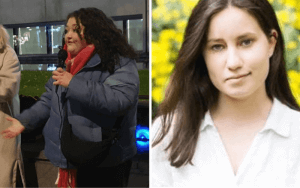
Kate Grey was speaking after the government announced that its Project Ability scheme, which supports disabled and non-disabled children to work together to increase inclusive sporting opportunities, had been extended by another year, thanks to another £300,000 of funding.
The Department for Education scheme aims to increase the number of disabled pupils taking part in competitive sport, and improve the expertise of their teachers.
It is delivered through the Youth Sport Trust as part of the annual School Games, and provides training for school staff, as well as supporting the development of school club activities and competitive opportunities.
Over the last year, there have been 100 events to improve the inclusive practice of staff in PE and sport.
And more than 1,250 young disabled people have received mentoring visits from Olympic and Paralympic role models.
Kate Grey, a retired Paralympic swimmer and BBC sports reporter, who has been a mentor with Project Ability for the last two years, welcomed the new funding.
She said: “For those disabled children who would not be able to compete at mainstream sports, something like boccia or table cricket means they can compete because they have exactly the same inclusive rules as non-disabled children.
“It gives them the empowerment to say: ‘I can be good at this sport.'”
Finding out about sporting opportunities for disabled young people should not come down to chance, she said, as her first competitive event against other disabled swimmers had done, when she was luckily told about an event in Cheddar, Somerset, as a 10-year-old.
She points to that event as the moment that her career as a Paralympic swimmer began.
“There should be opportunities there and young people should be able to choose to take them,” she said.
Grey told Disability News Service that when she holds Project Ability workshops, she tries to encourage the young people to be the “driving force”, to “nag” their teachers to set up boccia sessions or other inclusive sports activities in the school hall at break-time.
She encourages them to think creatively about how they can develop such opportunities.
“The whole point of Project Ability is to give non-disabled and disabled pupils the chance to discuss issues they face, worries they might have, and then overcome them through practical and theory-based workshops.
“Over the course of the day… the change that you see is quite incredible.
“They have gone from worrying about talking to each other and not really understanding each individual’s needs to by the end they are challenging each other, they are speaking confidently and they are ready to deliver what they have learned to their own schools.”
This might see them going back to their own schools determined to set up a multi-skilled, fully-inclusive sports club.
The non-disabled children tend to “come in slightly more nervous, because they are out of their comfort zone completely and they have got to learn from the young disabled people,” she said.
“But they make the biggest development because a lot of them are not the sportiest in the class. They just have a passion for coaching and teaching and leading and volunteering.
“All the way throughout the day they get these little challenges, so by the end they feel so empowered because they feel: ‘We can do this, we are never going to let someone sit out in a PE lesson anymore because we know there’s a way they can get involved.'”
The programme has led to improved links between mainstream and special schools, she said.
And changing the attitudes of non-disabled children through Project Ability could help to address problems like disability hate crime in the future, she added.
“The more and more young people we can reach out to… They are the next generation. If we can create that positive attitude at a young age, it is only going to live with them for years to come, and [they will] reach out to that wider community and prevent wider community issues, such as abuse on the streets.”
She said it could also avoid non-disabled young people developing “pre-conceived ideas in the workplace”, and lead to more people “having the opportunity to become managers and not just the outside or the interim jobs, and not pigeon-holed in a ‘disability job'”.
She said Project Ability showed there was a lasting legacy from the London 2012 Paralympic Games.
She said: “Making the project bigger and bigger every year is going to make sure that that legacy does live on and not one child will miss out on getting a real positive experience.”
27 March 2014

 Black disabled pupils face systemic barriers and injustice at school, says new report
Black disabled pupils face systemic barriers and injustice at school, says new report Reforms to disabled students’ support ‘will confuse and dilute our rights’
Reforms to disabled students’ support ‘will confuse and dilute our rights’